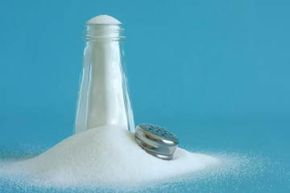Salt is crucial to the functioning of the human body. It helps your muscles contract, assists nerve impulses as they travel through you, and plays a part in maintaining your fluid levels.
But like most good things in life, too much of it is bad news. The average adult needs only about 500 milligrams of salt per day [source: National Agricultural Library]. To put it in perspective, one teaspoon of salt equals 2,325 mg, and one cup of chicken noodle soup has about 1,100 mg [source: Mayo Clinic]. The U.S. Department of Health and Human Services recommends 1,500 mg of salt per day, tops [source: Zajac].
Advertisement
Why is too much salt a problem? It can dehydrate you and lead to heart problems and even stroke due to its effects on blood pressure. But your body has a system for dealing with it -- that is, if it's not totally overwhelmed by the amount of sodium entering your mouth.
Your body's primary method for ridding itself of salt is urination. Your kidneys adjust the rate of loss, passing more out of the body when there's excess and withholding it if there's not enough in your system.
But salt also escapes our bodies through the skin. When we sweat, water -- along with skin cells, lipids, and salts -- travels through hair follicles until reaching the surface of the skin. When that water evaporates, it leaves behind salts and other matter it carried out of the follicles. This can actually leave a layer of salty crust on your skin.
It's possible to sweat out 8 grams of salt a day, although you'd have to sweat several quarts of water to do it. But the amount of salt in your sweat can vary, and it's not dependent on your diet. Some people just sweat more than others, and some sweat more salt than others. And you can even sweat different amounts of salt at different times, depending on the heat and how acclimated one is to it.
Our answer? People who sweat a lot don't necessarily eat more salty foods, and sweating isn't your body's primary way of eliminating salt.
You should remain mindful of your salt intake, but blame something else (like genetics) for your sweaty problems.
Advertisement


